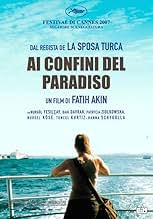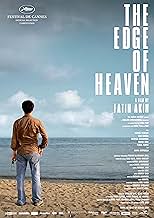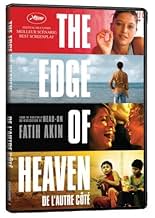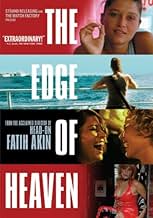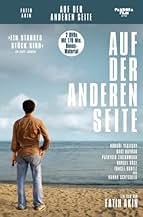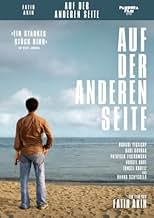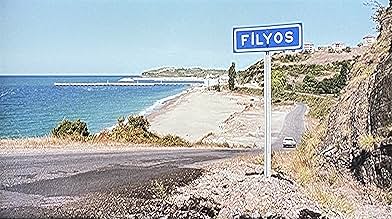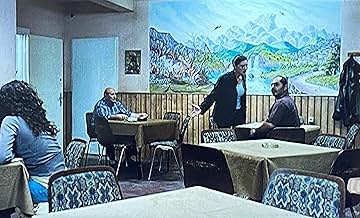NOTE IMDb
7,7/10
35 k
MA NOTE
Un homme turc se rend à Istanbul pour retrouver la fille de l'ex-petite amie de son père.Un homme turc se rend à Istanbul pour retrouver la fille de l'ex-petite amie de son père.Un homme turc se rend à Istanbul pour retrouver la fille de l'ex-petite amie de son père.
- Réalisation
- Scénario
- Casting principal
- Récompenses
- 37 victoires et 22 nominations au total
Avis à la une
I usually comment on films right after I've seen them. However, "Auf der anderen Seite" (The Edge of Heaven), touched me in a way that few films do, so a month has passed.
This story of two sets of mothers and daughters, a father and his son...and a gun seems familiar, but its resolution is anything but. To lay out the plot would be daunting. So much ground is covered, yet it unfolds effortlessly. F a t i h Akin's screenplay is elliptical--the story starts where it finishes--but by the end, when the opening scene is replayed, our journey with these characters puts us, indeed, on the edge of transcendence.
Amid the desperation on display, small details brim over the images: a son waters his father's tomato plants pausing to taste the ripened fruit, a mother pits cherries that stain her fingers, another manicures her nails to avoid a quarrel, we imagine a bookstore's--specifically a German language bookstore in Istanbul--smell and the safety it can bring to a foreigner.... These domestic details are set against much larger, although finally insignificant, struggles: the cultural divide of immigrants, students revolting against an oppressive government, how imprisonment can deaden the soul. But F a t i h Akin wants the basic struggles of family bonds to be central here. It's the resolution of family rifts--small and large, emotional and physical--that are urgent.
The choice of settings, music, lighting... all carefully selected to build toward one moment that catches us off guard. When a foreigner asks "What is Kurban Bayrami?" (a Turkish holiday) the many seemingly disparate elements that we've been watching--in good faith because they're so rivetingly told--suddenly come together, it almost knocked the breath out of me.
Whether or not we as viewers have lost a father or mother or a child, through death, physical separation or emotional turmoil, we can understand what these characters suffer. And how all that can be healedthe willingness to have faith that good intentions can mend this troubled worldis something like a miracle to find illustrated on film. The weapons these characters lay down to pursue goodness don't necessarily have the effect they intend, but as we watch lives torn apart and then healed we see what they don't. And we carry that lesson out of theater with us.
This story of two sets of mothers and daughters, a father and his son...and a gun seems familiar, but its resolution is anything but. To lay out the plot would be daunting. So much ground is covered, yet it unfolds effortlessly. F a t i h Akin's screenplay is elliptical--the story starts where it finishes--but by the end, when the opening scene is replayed, our journey with these characters puts us, indeed, on the edge of transcendence.
Amid the desperation on display, small details brim over the images: a son waters his father's tomato plants pausing to taste the ripened fruit, a mother pits cherries that stain her fingers, another manicures her nails to avoid a quarrel, we imagine a bookstore's--specifically a German language bookstore in Istanbul--smell and the safety it can bring to a foreigner.... These domestic details are set against much larger, although finally insignificant, struggles: the cultural divide of immigrants, students revolting against an oppressive government, how imprisonment can deaden the soul. But F a t i h Akin wants the basic struggles of family bonds to be central here. It's the resolution of family rifts--small and large, emotional and physical--that are urgent.
The choice of settings, music, lighting... all carefully selected to build toward one moment that catches us off guard. When a foreigner asks "What is Kurban Bayrami?" (a Turkish holiday) the many seemingly disparate elements that we've been watching--in good faith because they're so rivetingly told--suddenly come together, it almost knocked the breath out of me.
Whether or not we as viewers have lost a father or mother or a child, through death, physical separation or emotional turmoil, we can understand what these characters suffer. And how all that can be healedthe willingness to have faith that good intentions can mend this troubled worldis something like a miracle to find illustrated on film. The weapons these characters lay down to pursue goodness don't necessarily have the effect they intend, but as we watch lives torn apart and then healed we see what they don't. And we carry that lesson out of theater with us.
The Edge of Heaven
This is such a powerful, expansive, yet intimate movie about one of the things that matters most in our times, it's hard to fault it. The acting, the events, the setting, and implications of all these characters meeting and not quite meeting, suck you in. If it seems to have a lull now and then, you end up feeling the pace of their lives, and the pace of life itself. The events, even when they have a comic twist, are so heady and difficult they could make whole films each by themselves, but here they work through several related sections within a single tapestry.
As strong as the acting is, the core of the movie is the series of events, the plot. You'll see early on some coincidences beyond reason, making the plot almost Shakespearean, and therefore artful. The roles are each character are just a little surprising, just enough to keep us curious, yet each character represents a distinctive aspect of the crosscurrents of German and Turkish cultures and worlds, such as old people assimilating and young people refusing to assimilate. Even more than the mixing of Mexican and American worlds here in the U.S., this is a dramatic and more contentious melding, fraught with all those dangers of misunderstanding we hear in the news every day. Yet when it's brought down to the level of individuals, even seemingly unyielding ones, humanity wins.
I don't know how this film will carry itself in a couple decades. As well made as it is, it feels rooted in the moment, and when the times change yet again, there might be some kind of art or magic or transcendence missing to make it fully transport a viewer. It will remain interesting, but possibly less moving. But then, maybe the themes, of parents and children, of friends looking for who they miss and avoiding who they can't stand any more, might just be universal. But as a reflection of our world right now, 2009 (or 2007, when the movie was finished), it helped clarify just what life is like out there, beyond cinematic glitter and glam, beyond hyped up violence and romance. And beyond even the limitations of documentary in creating aura.
The Edge of Heaven happens to end with such lyrical highs, the name of the movie hits you hard. We are reminded of what exists beyond all the trappings that made so many people in the previous two hours so miserable, and it's there for us to tap into and to have in common, regardless.
This is such a powerful, expansive, yet intimate movie about one of the things that matters most in our times, it's hard to fault it. The acting, the events, the setting, and implications of all these characters meeting and not quite meeting, suck you in. If it seems to have a lull now and then, you end up feeling the pace of their lives, and the pace of life itself. The events, even when they have a comic twist, are so heady and difficult they could make whole films each by themselves, but here they work through several related sections within a single tapestry.
As strong as the acting is, the core of the movie is the series of events, the plot. You'll see early on some coincidences beyond reason, making the plot almost Shakespearean, and therefore artful. The roles are each character are just a little surprising, just enough to keep us curious, yet each character represents a distinctive aspect of the crosscurrents of German and Turkish cultures and worlds, such as old people assimilating and young people refusing to assimilate. Even more than the mixing of Mexican and American worlds here in the U.S., this is a dramatic and more contentious melding, fraught with all those dangers of misunderstanding we hear in the news every day. Yet when it's brought down to the level of individuals, even seemingly unyielding ones, humanity wins.
I don't know how this film will carry itself in a couple decades. As well made as it is, it feels rooted in the moment, and when the times change yet again, there might be some kind of art or magic or transcendence missing to make it fully transport a viewer. It will remain interesting, but possibly less moving. But then, maybe the themes, of parents and children, of friends looking for who they miss and avoiding who they can't stand any more, might just be universal. But as a reflection of our world right now, 2009 (or 2007, when the movie was finished), it helped clarify just what life is like out there, beyond cinematic glitter and glam, beyond hyped up violence and romance. And beyond even the limitations of documentary in creating aura.
The Edge of Heaven happens to end with such lyrical highs, the name of the movie hits you hard. We are reminded of what exists beyond all the trappings that made so many people in the previous two hours so miserable, and it's there for us to tap into and to have in common, regardless.
"Auf der anderen Seite" is the first Faith Akin-movie I have seen, and I was surprised by how balanced and mature it was. Looking at Akin's young age and the "gang"-background of his youth, I was expecting something much louder, more brutal, more explicit, more devastating. What "Auf der anderen Seite" is, is a deeply humanistic and thoughtful movie.
The thing that I loved most about it, is that every single character is written so well. No one is a villain or a bad person per se, they're all just human, struggling to do what they think is right. The actors and actresses portraying these characters are fabulous. I've rarely seen such convincing and natural performances.
Finally, the story itself is original, unagitated and beautiful. The individual plot lines don't come together as you think they would or as you think it might be best for the characters. When the movie ends, you will find that everything did resolve in a way. It's hard to explain it, if you haven't seen it. Let's just say this: "Auf der anderen Seite" doesn't have the average Hollywood-solution, but it will leave you with a lot to think about when the credits quietly start running.
This movie really impressed me, and I can't wait to finally see Akin's other works. Apparently Germany's finally got a really interesting filmmaker deserving of all the praise he gets.
The thing that I loved most about it, is that every single character is written so well. No one is a villain or a bad person per se, they're all just human, struggling to do what they think is right. The actors and actresses portraying these characters are fabulous. I've rarely seen such convincing and natural performances.
Finally, the story itself is original, unagitated and beautiful. The individual plot lines don't come together as you think they would or as you think it might be best for the characters. When the movie ends, you will find that everything did resolve in a way. It's hard to explain it, if you haven't seen it. Let's just say this: "Auf der anderen Seite" doesn't have the average Hollywood-solution, but it will leave you with a lot to think about when the credits quietly start running.
This movie really impressed me, and I can't wait to finally see Akin's other works. Apparently Germany's finally got a really interesting filmmaker deserving of all the praise he gets.
With a small scale ensemble cast, The Edge of Heaven examines several themes through the lives of the many characters. Nejat Aksu (Baki Davrak) is a professor of literature in a German university and not happy about his father Ali's new live-in partner Yeter (Nursel Köse), a prostitute who Ali (Tuncel Kurtiz) has hired to stay with him. Yeter has an estranged daughter Ayten (Nurgül Yesilçay) who Nejat decides to track down in Turkey after a tragedy occurs in the family. However, unbeknownst to Yeter and Nejat, Ayten has already traveled to Germany to look for her mother and seek a refugee status as she is a member of a rebellious activist group in Turkey. In Germany she meets a female student Charlotte (Patrycia Ziolkowska) who offers her a place to stay and eventually follows her back to Turkey, much to her mother Susanne's (Hanna Schygulla) chagrin.
The two main story lines (those of Nejat / Yeter and Ayten / Charlotte) are presented after each other in a clear manner but the stories intertwine in many ways, often unnoticed by the characters, creating an extra feel of tragedy – the answer would be so close if only they knew each other! Besides the smaller instances of bad luck, the deaths of major characters are what end up driving the plot forwards, but in the end the message is hopeful; an understanding is what everybody is ultimately seeking.
Akin's calm direction and the good performances throughout easily raise The Edge of Heaven among the best Turkish films I've seen (even though I have only seen a handful). The themes of finding one's true calling in life, the forgiving nature of parent–child relationships and the subpar human rights situation in Turkey are all explored without haste, always maintaining the balance between the different aspects of the story. For anyone who hasn't seen many Turkish films, The Edge of Heaven could be a good starting place, but I imagine it is also worth seeing for those more familiar with the country's cinema.
The two main story lines (those of Nejat / Yeter and Ayten / Charlotte) are presented after each other in a clear manner but the stories intertwine in many ways, often unnoticed by the characters, creating an extra feel of tragedy – the answer would be so close if only they knew each other! Besides the smaller instances of bad luck, the deaths of major characters are what end up driving the plot forwards, but in the end the message is hopeful; an understanding is what everybody is ultimately seeking.
Akin's calm direction and the good performances throughout easily raise The Edge of Heaven among the best Turkish films I've seen (even though I have only seen a handful). The themes of finding one's true calling in life, the forgiving nature of parent–child relationships and the subpar human rights situation in Turkey are all explored without haste, always maintaining the balance between the different aspects of the story. For anyone who hasn't seen many Turkish films, The Edge of Heaven could be a good starting place, but I imagine it is also worth seeing for those more familiar with the country's cinema.
In his film The Edge of Heaven (2007), under original title Auf der anderen Seite (On the Other Side), Fatih Akin, a German writer-director of Turkish parentage, intertwines two stories, whose protagonists get caught in seemingly hopeless situations, both resulting in individual tragedies, stories with a cross section on the character of a young Turkish German professor, Nejat Aksu (Baki Davrak) whom we first meet living in Bremen and lecturing in the German literature university classes, who returns to Turkey, on a (futile?) quest for the lost daughter of his father's suddenly deceased girlfriend, and (unexpectedly?) stays there where he, quite appropriately to his vocation and interests, buys and maintains an Istanbul bookstore with exclusively German books (or books translated in to German) on offer, two stories which gradually approximate each other, but never actually "resolve" one in to another. Still, the end is open, with the possibility for resolution, future cleansing what-so-ever, of the souls heavily burdened with guilt from the past.
Film touches real life situations, ranging from usual family tensions and quarrels, through losses suffered due to physical separation or emotional disorder, all the way to ultimate loss, death of the dear one, and in doing so engages audiences on the first-person level, because nobody is spared from at least a single such experience, or two or more. Such an easy and deep identification with on-screen happenings, with how they develop, how they are mended or not... is what we feel all along, and what we carry out of the theatre when the film is over... Split between two sides, Life and Death on the edge, but who's to tell which side is the Heaven and which one is the Hell?
Heavy matters tackled, yet easy to relate to, feel for affected characters and empathize with them, in an emotionally charged and very engaging film.
Film touches real life situations, ranging from usual family tensions and quarrels, through losses suffered due to physical separation or emotional disorder, all the way to ultimate loss, death of the dear one, and in doing so engages audiences on the first-person level, because nobody is spared from at least a single such experience, or two or more. Such an easy and deep identification with on-screen happenings, with how they develop, how they are mended or not... is what we feel all along, and what we carry out of the theatre when the film is over... Split between two sides, Life and Death on the edge, but who's to tell which side is the Heaven and which one is the Hell?
Heavy matters tackled, yet easy to relate to, feel for affected characters and empathize with them, in an emotionally charged and very engaging film.
Le saviez-vous
- AnecdotesNurgül Yesilçay - who is a big star in her native Turkey - had doubts about taking on the part of Ayten as she wasn't sure how audiences would react to seeing her as a revolutionary lesbian.
- GaffesIn the film, the year is 2006 and it is the Festival of Sacrifices (Kurban Bayrami), a religious holiday. Everybody is in summer clothes and many of them are sweating. The Festival of Sacrifices in 2006 in Turkey was in winter, at the end of December.
- Citations
story: After telling the story of Abraham that was willing to sacrifice his son, Ismael, to show God his obedience. Before Abraham could slay his son God sent a lamb to sacrifice instead.
Nejat Aksu: I asked my dad if he would have sacrificed me as well.
Susanne Staub: And what did he say?
Nejat Aksu: That he would even make an enemy of God to protect me.
- Crédits fousThe film's title appears twice: in the middle of the film at 1 hour 25 mins and after the end credits.
- ConnexionsFeatured in Fatih Akin - Tagebuch eines Filmreisenden (2007)
Meilleurs choix
Connectez-vous pour évaluer et suivre la liste de favoris afin de recevoir des recommandations personnalisées
- How long is The Edge of Heaven?Alimenté par Alexa
Détails
- Date de sortie
- Pays d’origine
- Sites officiels
- Langues
- Aussi connu sous le nom de
- The Edge of Heaven
- Lieux de tournage
- Sociétés de production
- Voir plus de crédits d'entreprise sur IMDbPro
Box-office
- Montant brut aux États-Unis et au Canada
- 742 349 $US
- Week-end de sortie aux États-Unis et au Canada
- 14 257 $US
- 25 mai 2008
- Montant brut mondial
- 17 804 565 $US
- Durée1 heure 56 minutes
- Couleur
- Mixage
- Rapport de forme
- 1.85 : 1
Contribuer à cette page
Suggérer une modification ou ajouter du contenu manquant

Lacune principale
By what name was De l'autre côté (2007) officially released in India in English?
Répondre

